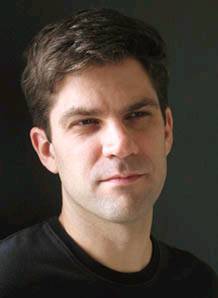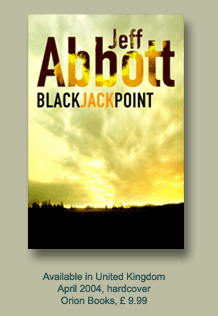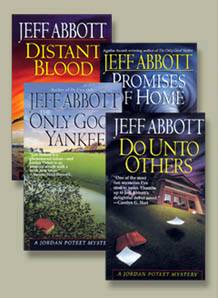Jeff Abbott may be a new name to
UK readers but in his native USA he is a national best-selling author. A
fifth-generation Texan, he spent his childhood in Dallas and Austin, where he
now resides with his wife and two sons. The nominations have been flowing in:
an Edgar, an Anthony and a Barry. But what makes this guy tick? Let's find out,
shall we?

Can you talk a little of your
original motivation for writing?
I've
wanted to be a writer since I was a teenager; I wrote a 400-page manuscript, in
longhand, when I was sixteen. Truly dreadful, I hope they bury that manuscript
with me so it never sees the light of day. But I have always loved reading,
loved stories. I come from a tradition of Southern story tellers; my
grandmother, grandfather, and dad could really spin great stories, and I grew
up listening to them.
A lot of writers talk about having read a really bad mystery novel, and that
motivating them to try writing a book themselves, but I'm much more motivated
by reading the greats in the field, seeing how they push the boundaries of the
crime novel. To me trying to reach higher is a bigger motivation than trying to
trump someone who wrote an unreadable novel.
Before the success of CUT
& RUN, you had previously written four Suspense novels featuring Jordan
Poteet. For the benefit of UK readers, could you give us some background to
these novels?
They
were very traditional mysteries, featuring a young man in a small East Texas
(think pine forests and rivers) town, with an extended family of Southern
eccentrics. The books had humor but also tragedy, because that's the way I
think life is. The books were published in the US by Ballantine as paperback
originals and amazingly, they are all still in print in the US and Japan and
still sell well, even though there has not been a new entry in the series since
1996. I get many requests to write another book in that series, but I'm really
focusing on writing mainstream suspense now. The books were great fun to write
and first showed the themes that are still of interest to me: family
relationships, loyalty, and the cost of choices people make when under extraordinary
pressure. I think they stand well as a quartet of novels because I ended the
last one with Jordan, as an amateur detective, finally paying a terrible price
for playing at policeman.
Why change direction and
introduce the partnership of Whit Mosley and Claudia Salazar?
The
Jordan books were told in first person, and I wanted to move into writing
third-person and move more into a suspense novel structure. But I liked the
idea of a detective who wasn't exactly a professional teamed with a real investigator.
I also wanted to explore bad guys who wouldn't fit neatly into Jordan's smaller
world. I was very interested in writing about the Texas Gulf Coast, which is a
funky, fascinating scene. When people think Texas, they tend to get this Wild
West vision in their heads, tumbleweeds and flat prairie, which is only part of
this huge state, and I wanted to explore the opposite end, which is the Gulf
coast. It has a wild history of money and crime, fortunes made and lost,
pirates and immigrants and cultures clashing. People on the edge seem to be
drawn to coasts, where one world ends and another begins. At least in Texas. So
all those elements of character, structure, and setting came together in the
Whit novels.
Tells us a little about Whit
Mosley & Claudia Salazar.
 Whit
is a justice of the peace, which is a magistrate who handles misdemeanor cases,
issues arrest warrants, and in rural Texas, they often serve as coroners.
Justices of the peace don't have to be lawyers. They are elected and then get a
couple of months of training and then off they go. So you have what is
basically a rookie investigator who is ordering autopsies, conducting inquests,
and ruling on causes of death. He absolutely has jurisdiction to investigate
cause of death, but Claudia, who is a detective on the Port Leo police
department, leads the investigation. They work as a team normally, except in
CUT AND RUN, where Whit is decidedly on the opposite side of the law and
Claudia is out of her jurisdiction. Whit got the job because of a political
appointment; he wears tropical shirts under his robe. He is about as far
removed from a stereotypical judge as I could imagine. He's from a very old
Texas family, the youngest of six brothers, with a cantankerous father who's
married to a young Russian mail-order bride. Whit is the son who has not
fulfilled his potential in anyone's eyes quite yet, but he doesn't seem to be
much worried about it; he's very much a guy who follows his own path. He is
more interested in justice than law, which could easily be a failing of being a
judge without a law degree.
Whit
is a justice of the peace, which is a magistrate who handles misdemeanor cases,
issues arrest warrants, and in rural Texas, they often serve as coroners.
Justices of the peace don't have to be lawyers. They are elected and then get a
couple of months of training and then off they go. So you have what is
basically a rookie investigator who is ordering autopsies, conducting inquests,
and ruling on causes of death. He absolutely has jurisdiction to investigate
cause of death, but Claudia, who is a detective on the Port Leo police
department, leads the investigation. They work as a team normally, except in
CUT AND RUN, where Whit is decidedly on the opposite side of the law and
Claudia is out of her jurisdiction. Whit got the job because of a political
appointment; he wears tropical shirts under his robe. He is about as far
removed from a stereotypical judge as I could imagine. He's from a very old
Texas family, the youngest of six brothers, with a cantankerous father who's
married to a young Russian mail-order bride. Whit is the son who has not
fulfilled his potential in anyone's eyes quite yet, but he doesn't seem to be
much worried about it; he's very much a guy who follows his own path. He is
more interested in justice than law, which could easily be a failing of being a
judge without a law degree.
Claudia is much more a by-the-book investigator. She grew up with Whit and
likes him but I don't think there's going to be a romance between them any time
soon, despite many reader pleas. She is a woman and a Latina, but I didn't want
to give her an endless or stereotypical set of problems of racism or sexism of
working in law enforcement. Those problems exist for her to a degree, but she's
respected by her fellow officers for the most part. More of her conflicts come
from that she divorced another law enforcement officer. In small towns,
everyone knows your business and that's magnified in small police departments.
I think she is an extraordinarily brave and resourceful woman--especially in
BLACK JACK POINT, where I put her through hell, and I love writing about her. I
could easily do a book where she is the focus more than Whit.
Of
course, the third major character in the books is Whit's friend, Gooch, a
grizzled and mysterious fishing guide who obviously has dealt with a lot of
violence in his past. Gooch is the kind of guy who believes force always wins
the day. Readers have sent me lots of theories on Gooch: that he's ex-mob,
ex-CIA or FBI, ex-Army, whatever.
One
day I'll do a book that explores Gooch's background, and I think it will shake
up the series. Whit loves Gooch like a brother but Claudia is not crazy about
Gooch, so that puts the three characters in an interesting triangle. Readers
love Gooch because he says or does what so many of us would like to with
complete disregard for the social or legal consequences.
What motivated you in writing
about mobsters & drug dealers as part of the themes in CUT AND RUN?
My
first goal is always to entertain, but I also wanted to explore the issue of
trust, because that is what Whit and his mother, Eve, don't have, but is what
they both need to become whole. Because trust is the foundation of both love
and forgiveness. Putting Whit and Eve with mobsters gave me an interesting
juxtaposition, because mobsters are supposed to have this unbreakable code of
trust between them. But they don't; many of the old crime families in America
have been shattered by successful racketeering prosecutions. These families
have self-destructed as they turned on each other once the government got a
foot in the door. So I wanted to put Whit and his mother in a situation where
they have to trust each other, and maybe love each other, but the world they
are both caught in, the mob, is falling apart because everyone is betraying each
other when things get extremely tough.
Do you think people will draw
parallels to the power struggle and characters from THE GODFATHER compared to
the Bellinis in CUT AND RUN?
Possibly.
I didn't have the Corleones in mind when I wrote about the Bellinis. The
Bellinis are more typical of a modern crime family, in that they're on their
last legs and they're attempting to redefine themselves in a world where
they've lost most of their power and reach.

In CUT AND RUN, you move the
action from Port Leo, Texas to Houston - why?
Whit's
long-missing mother could have turned up in Port Leo, but I think that would
have been too easy and rather boring. Whit needed to go on a journey, both
inside himself and outside, to reconnect with his mother.
Houston is very much a city of individualism and survival. It's a very contrary
city. For instance, it has no zoning laws; you can have a strip club down the
street from a church. Houston was built on bayous and swampland; the brochures
failed to mention to the early would-be settlers that they had a high risk of
dying of malaria or yellow fever.
It
went from being a small city to being the fourth largest in America in a matter
of a few decades, all driven by a single commodity, oil.
Houston
is, in a crazy, gigantic package, the American Dream with all its warts and
beauty. Houston is power and poverty and hope and hurricanes and a thousand
fortunes that never got made for every one that did. I thought with all its
history of ambition, failure, and survival, Houston made a good stage for CUT
AND RUN.
Could you explain the
reasoning behind Orion publishing Cut & Run, the third in the Whit Mosley
books, first?
Orion
acquired the books in an auction situation after UK publishers had seen CUT AND
RUN in manuscript form. I think Orion has a great deal of enthusiasm for CUT
AND RUN, and so wanted to release it first. Hopefully it won't be confusing for
people, as there's not really a lot of story carryover from A KISS GONE BAD and
BLACK JACK POINT. I have tried to write them as books where you didn't have to
have read them in order to understand the characters or their relationships.
And readers won't have to wait long: A KISS GONE BAD is due out in the summer
and BLACK JACK POINT in the winter, so all the books will be out in 2004.
What does it mean to you to
have been nominated for an Edgar Award, an Anthony Award, and a Barry Award?
Well,
it's extremely flattering and humbling when there are so many good writers out
there who deserve recognition. BLACK JACK POINT, the second Whit novel, got
nominated for all three awards you mention. CUT AND RUN just this week got an
Edgar nomination, and I was also nominated for an Edgar for a short story,
"Bet on Red", about a Houston hitman who goes to Las Vegas and makes
a surprise bet with his unsuspecting target, and then everything goes wrong for
the hitman. It was a fun story to write and I'm adapting it into a screenplay for
a short film. I was absolutely floored to be a double nominee this year. It is
truly an honor.
I am
fortunate all three of the Whit novels have garnered major award nominations.
It has definitely helped sales and increased interest.
What fascinates you in writing
about the criminal side of life?
I was
a pathologically well-behaved child. But when I was fourteen, I got into
reading crime fiction, primarily British authors like Christie and Tey and
American writers like Hammett and John D. MacDonald.
About
the same time, I found out a great-uncle of mine was in prison for killing a
man who had been having an affair with his wife. Not to defend what he did, but
my great-uncle had been crippled in World War II, was a decorated war veteran,
and he had been beaten several times by this other man who was sleeping with my
uncle's wife. The three of them were caught in this weird triangle of violence
and forgiveness. But after one beating my uncle went home, got a gun, went back
to the bar where the fellow was drinking, shot him dead, put the gun on the
bar, and requested that the bartender phone the police. My great-uncle was
convicted of manslaughter, not murder.
His
imprisonment was a closely guarded secret in my family, to protect my
great-grandmother, who was a very sweet and proper woman and would have died at
the thought of one of her ten children in prison. While he was behind bars, she
thought he was working in oil fields and moving around the country a lot, and
the family created this elaborate ruse to hide the truth. I found out about the
whole scheme by accident and then had to join the circle of silence and swear
not to tell. My great-uncle was a model prisoner and was paroled and moved in
with his sister and his brother-in-law-- who was the county sheriff. Only in
Texas. He never broke another law in his life. But I was just fascinated at the
idea that this murder could have happened in my family, and that knowledge came
at the same time that crime fiction seized my imagination. I think it was a
combination of realizing that almost anyone can commit a crime under the right
circumstances and that we never know the whole truth about anyone or what they
are capable of.
What do you consider is the
most important element in your writing?
I try
to strike a balance between plot and character. It's easy to be caught up in a
cool premise for a suspense story, but unless that plot is populated by
characters that resonate with the reader, it's just a writing exercise.
Sometimes I think of a situation first, other times I think of an interesting
character and the plot develops from what I think the character might do. With
CUT AND RUN, I had a "what if. . ." moment, being "what if Whit
found his mother and she's a criminal". I had already established in the
books she had walked away from the family years ago, so she was not a
sympathetic mother. So I started thinking about why she left, who she might be
now, what regrets she might have, and the story grew from her character which
came from that initial "what if...". But I am always striving for
that balance between the two elements, because I think that makes for the most
compelling suspense fiction.
I also
try to give the bad guys sympathetic qualities. Bad guys think they're the
heroes of their own stories, they're not sitting there thinking, "yeah, I
get to be evil today." In CUT AND RUN there's a scene where Paul Bellini,
heir to the crime family and a brutal killer, cries because his dad is slowly
dying. Paul's an absolute bastard, but he's terrified of losing his father. He
needs his parents just as much as Whit, the hero, does. I find villains who are
nothing but evil to be nothing but boring.
What does it mean to you to
have guys like Harlan Coben, Sharyn McCrumb and Rick Riordan praise your writing?
It
means a great deal to me, as they are writers I admire tremendously.
Harlan
has been unbelievably encouraging and supportive of my work.
Sharyn
is writing mainstream novels now, not crime fiction, but she is one of the most
brilliant writers working today. And Rick is just the nicest guy on the planet,
aside from being a huge talent.
What are you currently working
on?
I have
a new contract with Dutton for two novels, and they asked that the first one be
a standalone suspense novel. So I'm working on that now, and it's been great
fun and hard work and it should be out in hardcover in summer 2005 in the US.
After that, it will probably be another Whit/Claudia novel, we'll see. I'm also
working on the screenplay for "Bet on Red" that I mentioned earlier.
 JEFF ABBOTT BIOGRAPHY
JEFF ABBOTT BIOGRAPHY
CUT
AND RUN (2004 UK)
BLACK
JACK POINT (2002 US)
A KISS
GONE BAD (2001 US)
Jordan Poteet series:
DISTANT
BLOOD (1996)
PROMISE
OF HOME (1995)
THE
ONLY GOOD YANKEE (1995)
DO
UNTO OTHERS (1994)
My
thanks to Orion Publishing for their time and support.